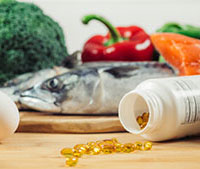News
Need More Vitamin D? Boost Your Intake with These Tips
Date: 01/05/21

Vitamin D is needed for numerous important body functions including the absorption of calcium to ensure strong bones. During summer, it’s easier to get sufficient exposure to direct sunlight which intensifies the presence of Vitamin D in the body. To help you get through the winter when the sun may not be quite as bright, we have put together five ways to increase your Vitamin D intake so you can reap its health benefits.
1. Start Supplements. The Vitamin D Council recommends taking a Vitamin D supplement to improve your body’s Vitamin D supply. Vitamin D3 is the most recommended Vitamin D supplement form to address vitamin deficiency.
2. Soak in Sun. You don’t have lay on a beach all day to catch enough rays to be beneficial. In fact, you only need about half the amount of time it takes your skin to burn or tan. Most experts recommend about 10 minutes of unprotected exposure during the peak sun times of 10 a.m. to 3 p.m. If you’ll be outside longer, make sure you apply sunscreen or wear protective clothing to avoid sunburn and increased chances of skin cancer.
3. Find Fish. Salmon and other fatty fish like mackerel and tuna are good-for-you sources of Vitamin D. Packed with omega-3 fatty acids, these fish also provide extra health benefits like possibly lowering blood pressure levels, increasing healthy brain function and preventing inflammation. Although most health associations classify food intake as a lesser source of Vitamin D, combining regular intake of these foods with supplements and direct exposure to sunlight can help you achieve ideal vitamin levels for your body.
4. Enjoy Eggs. If you don’t eat fish, eggs can help you get some Vitamin D into your diet. But make sure to eat the yolk because that’s where the vitamins and minerals are found. Studies show that chickens raised in pastures that are in a lot of sunlight produce three times more Vitamin D in their eggs than their commercially raised counterparts. You can also look for eggs that have Vitamin D added to increase your intake.
5. Find Fortified. Many foods now contain added Vitamin D, like orange juice, cereals and soy milk. Read nutrition labels to see how much of the recommended daily value of Vitamin D the food has. Ask your primary care provider for a recommendation of how much Vitamin D you should get each day to compare.
This information is not intended as a substitute for professional medical care. Please always follow your healthcare provider’s instructions. Programs and services are subject to change. Managed Health Network, LLC (MHN) is a subsidiary of Health Net, LLC. The MHN companies include Managed Health Network and MHN Services, LLC. Health Net and Managed Health Network are registered service marks of Health Net, LLC or its affiliates. All rights reserved.
.jpg)
